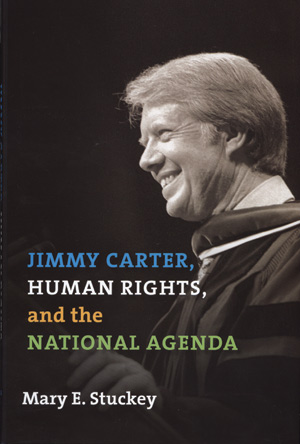
There is a strong belief in the media and among scholars that the best way to lead is by focusing clearly and consistently on one idea at a time. That if a president wants to influence policy, he must articulate one clear and coherent argument about that policy until it gets past. Bill Clinton, for instance, said he would focus on the economy “like a laser beam.” But I think it’s more complicated than that. Jimmy Carter, Human Rights, and the National Agenda shows how presidents can influence policy and public opinion in other ways.
Jimmy Carter put human rights at the center of his administration, and was sharply criticized by both the Right and the Left for how he managed human rights policy. He didn’t get a lot of what he wanted in the short term. But in the long term, he has proven to be enormously influential, and human rights remain an important component of policy. So this book offers a different model of presidential leadership, one that focuses on how presidents may be understood as failing in the short term, but actually succeeding in the long term.
Carter put human rights on the national agenda and did so in such a way that human rights are still there. Carter did this because the issue was already on the agenda in a small way—people had begun to talk about human rights issues when Carter became president. Second, as president, Carter spoke about the topic all the time, giving it a prominence it could not have had without him. Third, he spoke about human rights in particular kinds of ways. Fourth, the term itself resonated so well with long-standing American values and beliefs. Fifth, Carter established an administrative bureaucracy for human rights that meant human rights would live on in the executive branch after he left office.
I argue that presidential leadership is about more than giving speeches or signing laws; it’s a complicated combination of both.
“Presidents—even those who were notoriously poor at public communication—can influence the public while they are in office and even long after they have left.”
Scholars of the presidency argue about whether what the president says matters. We wonder if anyone is listening; if they are, whether the president has the ability to persuade them; what the limits of that ability are; whether language choices, style, etc. matter. This book contributes to that conversation by arguing that presidents—even those who were notoriously poor at public communication—can influence the public while they are in office and even long after they have left. Carter’s longevity as a public figure with a particular authority on human rights issues is evidence of this.
The questions of what sorts of effects rhetoric has, and how we might know what those effects are, are tricky and occupy a good deal of time in the field. These questions go to the heart of democracy. If democracy is understood as a form of government that requires leaders to make arguments to defend their actions to the governed, then it is vital that we understand the nature of those arguments and how they affect people and politics.
I have been working at the intersection of communication and political science my whole career. I’ve worked on understanding the rhetoric of particular presidencies, especially Ronald Reagan’s, on understanding specific events like the speech given in response to the Challenger crisis, and on understanding the role of presidential rhetoric in forming and reforming our sense of who we are as a people. I’ve also worked in the area of media criticism. So I read a lot of the literature on priming, framing, and agenda setting. And I’m trained as a political scientist, so I read a lot of the work on public opinion and the presidency. The latter isn’t usually read by rhetoricians, while many presidency and media scholars don’t normally read a lot of rhetorical analyses.
Writing this book was so fun because very few people could have written it. As a scholar of the presidency, of the mass media and of political rhetoric, I am familiar with a broad array of literature that is usually compartmentalized—but those compartments can be brought into conversation with each other.
Selecting one particular close-up is hard: I’m trying to make the argument that all the different elements of Carter’s treatment of human rights were important. If just one thing had to pulled out, however, it would be the chapter on how four presidents used “human rights.” I looked at the ways Jimmy Carter, Ronald Reagan, Bill Clinton and George W. Bush all used similar language—sometimes to very similar ends and sometimes to very different ones.
Carter wanted to see human rights at the center of our foreign policy—and he wanted to be able to criticize and applaud any nation, whether ally or not, on human rights grounds. He was often criticized, in fact, for being kinder to our opponents than to our allies. Reagan had a very different approach to human rights, and tended to overlook human rights problems in allied countries while focusing on abuses in communist nations. Bill Clinton, governing after the Cold War, took a complex approach to human rights, in which he used the issue as a rationale for intervention in some areas (Bosnia) while avoiding intervention in other areas (Rwanda). And George W. Bush, of course, is the most problematic of the lot, for he used human rights as a reason for the Iraq invasion, and yet had to deal with events like the Guantanamo prison scandal.
This history is crucial because on the one hand, it doesn’t matter who is president—the institution is strong, and whoever sits behind that desk is going to make the same decisions. On the other hand, it matters a great deal who the president is—some decisions, such as the choice to go to war in Iraq, are extraordinarily dependent upon who is in office. The trick is knowing which decisions are which.
“Jimmy Carter, Ronald Reagan, Bill Clinton and George W. Bush all used similar language—sometimes to very similar ends and sometimes to very different ones.”
I think this book is significant for two reasons.
First, there is so much smart work in the world that it is almost impossible to keep up with your own field, much less get into a field where you aren’t comfortable. I’m lucky because I’ve always been at the intersection of different areas. That is not to say that I am the expert in any one of them, but I am aware of the work in a lot of different fields. So I was able to synthesize some of the most important ideas from several different subfields. Hopefully, the book brings some insight that we wouldn’t otherwise have.
Second, I think it is important for us to understand how the presidency really works in relation to the mass public. When are presidents persuasive? How does that persuasion work? What are the consequences? The presidency looms so large in public affairs and the stakes are so high that any insight we can muster on the institution is important.


Mary E. Stuckey specializes in political and presidential rhetoric, political communication, and American Indian politics. She is the author, editor, or co-editor of twelve books and author or coauthor of roughly 80 essays and book chapters. She has received the NCA Distinguished Scholar Award, the Michael M. Osborn Teacher/Scholar Award, the Rose B. Johnson Award (with Zoe Hess-Carney), the Roderick P. Hart Outstanding Book Award, the Marie Hochmuth Nichols Award, and the inaugural Carl Couch Center Bruce E. Gronbeck Political Communication Award. She has served as editor of the Southern Communication Journal and as book review editor for Rhetoric and Public Affairs. She is Editor-elect of the Quarterly Journal of Speech. She currently co-edits (with Mitchell McKinney) Peter Lang’s series, The Frontiers of Political Communication. She received the John Sisco Teaching Award from the Southern States Communication Association, the Pi Sigma Alpha Teaching Award from the American Political Science Association, and the Elsie M. Hood Teaching Award from the University of Mississippi. Her current book project is on the rhetoric of political change.